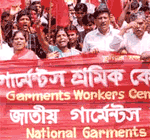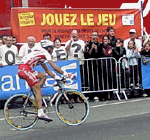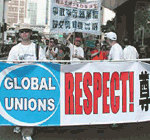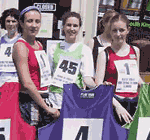As expected, International Labour Day on 1 May was
a big day for the "Play Fair" campaign. Here's
a sample of some of the campaign actions.
In Tirupur in South India 4 800 workers participated in
demonstrations highlighting the appalling conditions facing
sportswear workers, organised by the MLF trade union and
supported by the human rights organisation SAVE. There was
good local media coverage.
In Mirpur in Bangladesh several hundred garment workers
marched down the main street chanting "Play Fair at
the Olympics - Respect Workers' Rights!". The march
was organised by the Bangladesh National Garment Workers'
Federation.
In Bangkok, the May Day rally was one of the biggest ever,
with 60-80,000 people protesting about a range of issues
including electricity privatisation and minimum wage levels.
Workers involved in the Thai Labour Working Group carried
creative "Play Fair" campaign banners and distributed
2,000 campaign fliers.
In Perth in Australia "Play Fair" campaigners
were body-painted in the Olympic colours – ensuring
that they stood out in the annual May Day rally. In Brisbane
campaign supporters waved placards and banners and marched
around the "clothesline of Olympics dirty washing"
bearing phrases such as "1 death threat for trying
to join a union" and "$3 a day for making $120
running shoes".
In Columbo, Sri Lanka, the Free Trade Zones & General
Sevices Employees Union carried a banner in the May Day
march which said: "MAKE PLAY FAIR AT THE OLYMPICS BY
RESPECTING WORKERS RIGHTS IN THE SPORTSWEAR INDUSTRY".
The march highlighted such issues as freedom of association,
compulsory overtime for women workers and alternative employment
for garment workers who will lose their jobs as a result
of the phase-out of the Multi-Fibre Agreement.
In Pakistan, members of the Working Women Organisation
carried "Play Fair" campaign posters in their
International Labour Day rally and released a statement
to the press about the campaign.
In Indonesia, members of the Indonesian trade union GSBI
demonstrated outside of the Jakartan office of Nike.
In Kaohsiung city in Taiwan the "Play Fair" campaign
featured in a march and rally organised by the Kaohsiung
City Human Rights Association, Taiwan Democratic Labor Party,
Taiwan Gay and Lesbian Human Rights Association and the
Institute of Industry and Labor Study. The theme of the
event was Anti-Exploitation, Anti-Discrimination, Anti-Bullying.
The Hong Kong Clothing Industry, Clerical and Retail Trade
Employees General Union carried a banner promoting the campaign
in the annual May Day rally and campaign leaflets were distributed
In Belgium the European union celebrated May Day by holding
an open day. Campaigners set up a stall covered with posters,
leaflets and stickers from various European countries where
the "Play Fair" campaign is active (Belgium, Netherlands,
France, Sweden, UK, Ireland and Spain). Over 300 signatures
were collected.
There were also May Day actions linked to the "Play
Fair" campaign in the Philippines, the UK, Sweden,
Austria and the Netherlands.




